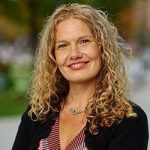5/1: Driving Democracy: How Social Workers Harness the Power of Ranked Choice Voting
A Virtual Event
Wednesday, May 1 2024
7:00 – 8:15 PM ET
Zoom
View the Recording
Join the Center for Innovation in Social Work & Health (CISWH) at BU School of Social Work (BUSSW) and BUSSW Votes for the final session in the From Ballots to Better Health virtual series, Driving Democracy: How Social Workers Harness the Power of Ranked Choice Voting. Dr. Tami Gouveia, CISWH director and Paul Farmer professor of practice; Rebekah Gewirtz, MPH, executive director of the Massachusetts and Rhode Island chapters of the National Association of Social Workers (NASW); and Ayesha M. Wilson, MSW, Cambridge city councilor will cover topics including how social workers are uniquely positioned to run and serve in elected office, how ranked choice voting can lead to more fair elections, and how social workers can advocate for this option.
Program:
7:00 pm: Opening remarks and introduction by Diane Crowley, BUSSW Fall River campus director,
7:05 pm: Dr. Tami Gouveia moderates discussion with Councilor Wilson and Rebekah Gewirtz
7:50 pm: Q&A with Dr. Gouveia, Councilor Wilson, Rebekah Gewirtz, and audience
8:10 pm: Closing remarks by Diane Crowley
Content Level: Intermediate
Learning Objectives:
- Participants will be able to describe the steps involved in running for office, from making the decision to run through election night.
- Participants will be able to describe how social workers are uniquely positioned to serve in elected office.
- Participants will be able to describe how ranked choice voting provides every voter in every election with real choices, fair outcomes, and the power to elect preferred candidates.
- Participants will be able to describe three ways to take action for ranked choice voting elections.
Continuing Education Credit Info:
This continuing education program is appropriate for LICSW, LCSW, LSW, LSWA, and other healthcare professionals and offers 1.0 national continuing education credit to social workers licensed in the U.S. who attend the program and complete a brief post-event quiz and evaluation.
About Dr. Tami Gouveia
Appointed director of the Center for Innovation in Social Work & Health and Paul Farmer professor of practice in 2023, Dr. Tami Gouveia has extensive experience as a leader in social work and public health, policymaking, and change management. Throughout her 25-year career, she has used her expertise to drive meaningful change, improve community health outcomes, and promote economic and racial equity. Before joining CISWH, she served in key leadership positions in nonprofit, philanthropic, and governmental organizations, including as director at the Massachusetts State Auditor’s Office, The Rippel Foundation, Tobacco Free Mass, and the Greater Lawrence Family Health Center. Believing in the power of people working together for our shared humanity, Dr. Gouveia founded and led several efforts, including the Lowell Roundtable on Substance Abuse Prevention and the Massachusetts Chapter of the Women’s March.
Dr. Gouveia was elected to two terms in the Massachusetts House of Representatives, where she passed legislation to combat the opioid crisis, defend reproductive justice and LGBTQ+ rights, advance housing and climate justice, reform education funding and the criminal legal system, and invest in programs to prevent and treat childhood trauma.
Dr. Gouveia holds a Doctor of Public Health in management, leadership, and policy and a Master of Public Health from the BU School of Public Health, and a Master of Social Work from the BU School of Social Work.
About Ayesha M. Wilson
Ayesha M. Wilson (she/her) serves on the Cambridge City Council. A mom and a product of Cambridge public schools and public housing, she is committed to serving Cambridge youth. Her experiences led her to become a social worker and to serve two terms on the Cambridge School Committee.
Wilson advocates for the needs of the Black and Brown community, including affordable housing and childcare for individuals and families, mental health resources, youth mentorship, and childhood literacy.
She is a member of the Greater Boston Association of Black Social Workers, the Board of Directors for the YWCA Cambridge, and the secretary of the Cambridge branch of the NAACP.
About Rebekah Gewirtz
Rebekah Gewirtz (she/her) directs the Massachusetts and Rhode Island chapters of the NASW. Previously, she served for more than eight years as the director of government relations and political action at NASW and served as the executive director of the Massachusetts Public Health Association.
Her work with NASW-MA includes successful efforts to advance social work practice through policy, including legislation protecting social workers from frivolous lawsuits and restrictive covenants; passing legislation granting social workers section 12 authority and improved safety in the workplace; and led the Chapter’s political action arm NASW- MA PACE, working with members to endorse and support candidates throughout Massachusetts who share social work values and priorities.
Gewirtz has long championed critical social justice issues and was a leader in the campaign to raise the minimum wage. She was co-chair of the Campaign for Our Communities, working with the support of nearly 100 organizations for a state revenue package that would be adequate and fair. She was a founding member of the Welfare Coalition where she fought to secure and preserve state safety net programs for the most vulnerable.
Accessibility Statement:
Boston University strives to be accessible, inclusive, and diverse in its facilities, programming, and academic offerings. Your experience in this event is important to us. If you have a disability (including but not limited to learning or attention, mental health, concussion, vision, mobility, hearing, physical, or other health-related issues), requiring communication access services for the deaf or hard of hearing, or believe that you require a reasonable accommodation for another reason, please contact the event organizer at [email protected] to discuss your needs.


